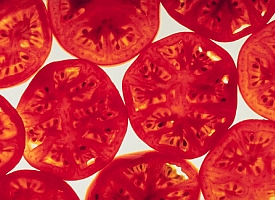Arcadia Biosciences Inc. in Davis, California, and Bioseed Research India Pvt. Ltd. in Hyderabad unveiled plans to develop a tomato with more durability and longer shelf life. Financial terms of the deal were not disclosed.
Because of their perishable nature, many fresh fruits and vegetables — including tomatoes — are bred for durability and yield rather than for nutrition and taste. Moreover, according to the companies, between 20 and 35 percent of tomatoes on average are lost to post-harvest damage in Asia. As the fourth largest producer of tomatoes globally, India represents a significant market opportunity for long shelf-life tomato technology.
Arcadia, an agricultural technology company, says it uses a screening and breeding technique that does not involve genetic modification. That technique makes it possible to identify genetic variations allowing tomatoes to fully ripen on the vine, yet still remain durable enough to survive the packing and shipping process. The new varieties, says Arcadia, can reduce waste and spoilage in the production cycle while ensuring that the produce is fully ripe and still fresh when it reaches consumers.
Arcadia’s screening technology that it calls Tilling, discovers variations at the genomic level, and is based on research conducted at the Fred Hutchison Cancer Research Center in the 1990s. In 2008, Arcadia used the Tilling technology to develop extended shelf-life tomatoes with the Spanish seed company Semillas Fito. That project also called for solutions not involving genetic modification.
Bioseed Research India is a subsidiary of the Indian conglomerate DCM Shriram Consolidated Ltd. (DSCL). Vikram Shriram, managing director of DSCL, says the tomato traits to be developed “are especially valuable in a country like India where fresh market tomatoes are grown mostly in the field and post harvest handling and logistics is rather poor.” Shriram adds, “We plan to grow our hybrid tomato seed business with this new technology which would increase the transportability and extend the shelf life of the tomato in addition to high yield and high disease tolerance….”
Read more:
- Process Developed to Determine Tomato Flavor Chemistry
- ARPA-E Grant Funds Development of Univ. Oil Plant Research
- Ozone Acts As Vaccine to Protect Fruit from Spoilage
- Genetic Modification Leads to Longer Tomato Shelf Life
* * *


 RSS - Posts
RSS - Posts
[…] U.S.-India Partnership to Develop Long Shelf-Life Tomato […]